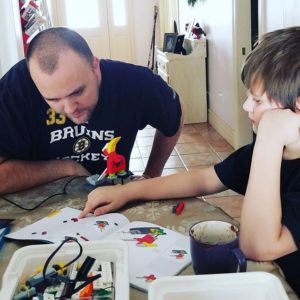By Leslie Ann Daniels, Oak Meadow teacher
My Oak Meadow colleagues and I often receive inquiries from home teachers regarding their child’s desire for perfectionism and the many frustrations that accompany this need. Working with children who display perfectionist tendencies can be quite challenging, so it is a valuable issue to address.
What Is a Perfectionist?
A perfectionist is someone who sets a standard of perfection and refuses to accept anything less. Unfortunately, in an imperfect world, the perfectionist’s view can be an individual’s worst enemy, especially for a child. The tendency for perfectionism can often be observed during a child’s school lessons. For example, a child may start writing out a lesson or drawing a picture, then repeatedly tear up the papers, only to begin again and again. A child with perfection tendencies may also easily cry or become quite frustrated if a simple mistake is made.
Where Does Perfectionism Come From?
Perfectionism in children usually arises because there is more focus on the form of the lesson or task, rather than on the process of the activity. This is one of the reasons why Oak Meadow continuously emphasizes focusing on the process vs. focusing on the final form (or goal).
What Should I Do If My Child Shows Perfectionist Tendencies?
Give Your Child Recognition & Appreciation
 Most children go through perfectionist phases, so it is important that we, as home teachers and parents, do not overreact to the minor cycles of perfectionism. Oak Meadow cofounder, Lawrence Williams, believed that what often remedies these phases is to give our children “extra doses of recognition and appreciation for the work that they do.” He also felt that this pattern of interaction is an extremely important part of our children’s development.
Most children go through perfectionist phases, so it is important that we, as home teachers and parents, do not overreact to the minor cycles of perfectionism. Oak Meadow cofounder, Lawrence Williams, believed that what often remedies these phases is to give our children “extra doses of recognition and appreciation for the work that they do.” He also felt that this pattern of interaction is an extremely important part of our children’s development.
Look Inward
When my children would show tendencies towards perfectionism, I not only looked at their individual needs and developmental cycles, but I also observed my own cyclic process. Did I find myself criticizing my own imperfections? Perhaps I said or did something that made me feel inadequate, or perhaps I felt guilty for being an imperfect mother or home teacher.
Let’s face it. We all have the desire to sometimes be perfect. We find ourselves wanting to please others, to do everything right, to make the perfect choice, etc. We especially want to be ideal parents. We also know that, no matter how well we try to hide these feelings, our children still have the ability to pick up on them and may even start expressing some of the same feelings. There was no doubt in my mind that, unless I stopped demanding this need for perfection in myself, my children would also grow up with the same tendencies. Not surprisingly, these perfectionist tendencies can result in a lack of self confidence.
Embrace Imperfections!
To help our children through their perfectionist phases, we need to allow our children, as well as ourselves, to be imperfect. It may require more energy, more love, and more patience. However, embracing imperfection is a crucial step in human development. Author and founder of “Healthy Mother Earth Foundation” Robin Lim once wrote: Imperfection is God’s gift. It makes us compassionate as well as deserving of compassion. It allows us to take risks, to fail and succeed, to learn and grow, to ask questions. It honors our differences, our individual styles.
Now, go right on ahead! With another seasonal change at our doorsteps, making its own perfectly imperfect way into the world, take a leap into the wonderful world of imperfection. Ask a silly question, take a risk, experiment with new ideas, laugh at your own idiosyncrasies, and make all kinds of wonderful mistakes!